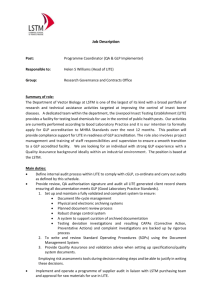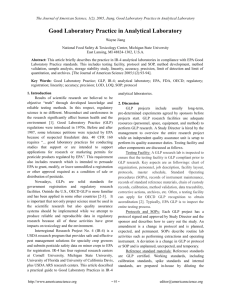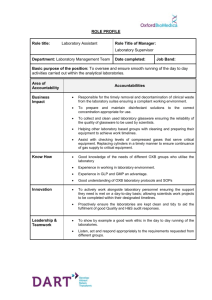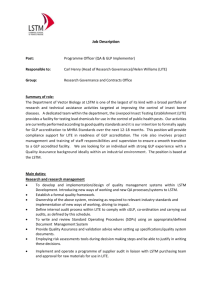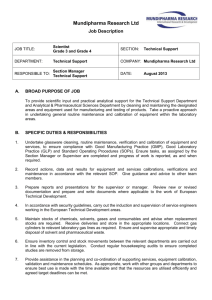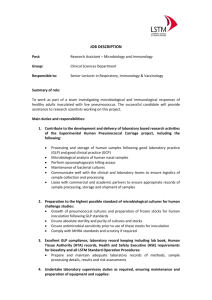The National GLP Compliance Programme
advertisement
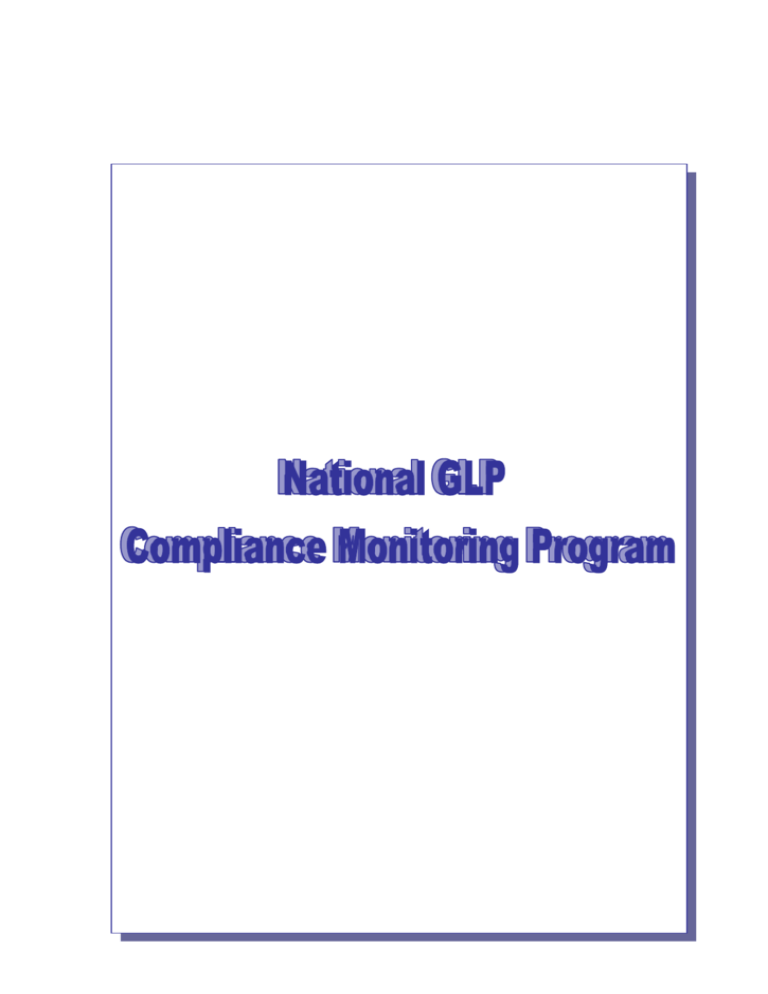
National GLP Compliance Monitoring Program Foreword The National Authority for Medicines and Health Products, I.P. (INFARMED) is the Monitoring Authority for the OECD/EU GLP scheme for medicinal products and cosmetics in Portugal and is also the Regulatory Authority in this area. INFARMED, has statutory responsibility for the enforcement of OECD Good Laboratory Practice scheme under the governmental regulation number 1070/90 of 24th October, nowadays by the Portuguese laws governmental decree number 95/2000 of 23rd May, and governmental decree number 99/2000, of 30th May. These decrees were issued to give effect of European Directives requiring testing on chemical substances to be carried out in accordance with the OECD Principles of Good Laboratory Practice (GLP). GLP applies to the testing of chemicals (e.g. medicinal products, cosmetics, industrial chemicals, plant protection products, food and animal feed additives), in order to obtain data on their properties and/or assess the effect of such substances on man, animals and environment. These substances or test items are frequently synthetic chemicals, but may be of natural or biological origin and, in some circumstances may be living organisms. This document presents the structure and operation of the Portuguese GLP Compliance Monitoring Programme. Introduction In accordance with the established in OECD Principles, Good Laboratory Practice (GLP) is a quality system concerned with the organisational process and the conditions under which laboratory studies are planned, performed, monitored, recorded, archived and reported. The GLP are designed mainly to apply to test facilities carrying out health and environmental safety studies on chemical substances, where the results are to be submitted to Regulatory Authorities, as required by regulations for the purpose of registration and licensing pharmaceuticals, pesticides, food and feed 2013-10-25 D:\533568034.doc Page 2 of 13 National GLP Compliance Monitoring Program additives, cosmetic products, veterinary drug products or similar products, and/or for the regulation of industrial chemicals. These Regulatory Authorities are governmental bodies with legal responsibility for the control of chemicals. The application of GLP assures the quality and integrity of data generated and allows this data to be used by Regulatory Authorities in hazard and risk assessment of chemicals. The Portuguese Government designated IPQ and INFARMED, under the laws governmental decree 95/2000 and governmental decree 99/200, as the competent authorities for verifying compliance with GLP/OECD in order to give effect to European Council Directives 87/18/EEC, 88/320/EEC, and European Commission Directive 90/18/EEC, codified versions 2004/9/CE and 2004/10/CE. The Decrees state that Test Facilities carrying out tests on chemical substances in accordance with European Directives, or any other Community provision, providing to evaluate their safety for man, environment or both, shall comply with GLP. 1. The Principles of (GLP) means the Principles of (GLP) reviewed and adopted by Council of the Organisation for Economic Co-operation and Development (OECD) on 26th November 1997, which formally amended the Annex 2 to the decision of 12th of May 1981 on the mutual acceptance of data for the assessment of chemical products. 2. The governmental decree 95/2000 (Art. 4º, nº 1) requires that Test Facilities carrying out tests on chemical substances in accordance with Council Directives or any other Community provision providing for the application of GLP to give notice to the competent authority stating that the tests have been carried out in conformity with the GLP Principles. Administration The National Institute for Pharmacy and Medicines (INFARMED) existed as such since January 1993. Its Organic Law has been revised as the result of 2013-10-25 D:\533568034.doc Page 3 of 13 National GLP Compliance Monitoring Program expanded responsibilities and in 2007 its name was changed accordingly to National Authority of Medicines and Health Products, I.P. INFARMED is a Public Institute, integrated in the Ministry of Health, with administrative and financial autonomy and its own property, is the Regulatory Authority for human medicinal products, and health products. All enquiries concerning GLP to medicinal products and health products should be addressed to: Autoridade Nacional do Medicamento e Produtos de Saúde, I.P. Parque de Saúde de Lisboa Av. do Brasil, 53 1749-004 Lisboa PORTUGAL Tel. 351 21 798 73 52 Fax: 351 21 798 72 57 Each competent authority/monitoring authority has the responsibility for the matters relating to GLP concerning each area, including inquiries from Regulatory Authorities, industry and GLP monitoring authorities in other countries. In order to facilitate communications between sponsors of studies, test facilities and receiving authorities, INFARMED provides information on inspections to interested parties in the forms of: Annual overviews of Test Facilities inspections are made available indicating the GLP compliance status of test facilities. 2013-10-25 D:\533568034.doc Page 4 of 13 National GLP Compliance Monitoring Program The information about the status of the test facilities in the programme are annually sent to UE/GLP Committee and OECD Countries members of the GLP WG. INFARMED gives a GLP Compliance Statement, to the Test Facility where an inspection reveals an adequate state of compliance with GLP. Inspections are performed by INFARMED GLP inspectors, supported, where necessary, by other suitable qualified experts contracted onto the team. INFARMED maintains records of test facilities inspected and their GLP Compliance Status. Records of study audits, for both national and international purposes, are also archived. Confidentiality Inspectors may have access to confidential and commercially valuable information whilst conducting inspections and audits and may even need to remove commercially sensitive documents from a test facility, or to refer to them in detail in their reports. The following provisions apply for the maintenance of confidentiality, not only for inspectors but also any other persons who gain access to confidential information, as a result of GLP compliance monitoring activities: Inspectors are required to carry means of identification. Experts contracted to perform Test facility Inspections and Study Audits are required to sign confidentiality agreements. The disclosure of information, except in the exercise of their duties, is prohibited as stated in the Decree-Law 58/2008, of 9 September, that ratifies Disciplinary Statute for Workers with Public Functions. Thus, civil servants and agents are obliged to act in order to build public confidence in the Public Administration particularly insofar as their impartiality is concerned. Copies of documents taken from test facilities should be identified. 2013-10-25 D:\533568034.doc Page 5 of 13 National GLP Compliance Monitoring Program Access to information and reports held by INFARMED is restricted. The Decrees make it an offence to disclose commercially sensitive or other confidential information (Other than to the Commission of the European Communities or the competent Authorities) unless it is necessary to do so for the purpose of the enforcement of these Decrees. Reports of test facilities inspections and study audits are made available only to Regulatory Authorities, if so requested by a Regulatory Authority, and where appropriate, to test facilities inspected or concerned with the study audits and /or to study sponsors. Disclosure of documents needs to be justified and authorised. Personnel and Training The GLP Monitoring Authority within INFARMED (Directorate of Inspection and Licensing/Inspections Unit) consists of an inspector scientifically qualified and having practical experience in a range of scientific disciplines relevant to the testing, and two inspectors in training. Inspectors are required to be familiar with the Principles of GLP and with the requirements necessary to comply with these Principles. Inspectors are required to undertaken appropriated training having regard to their individual qualifications and experience. Training should include training courses for GLP inspectors. Consultations including joint training activities where necessary, with National Monitoring Authorities of other EU member states or OECD member countries, in order to promote international harmonisation in the interpretation and application of GLP Principles and in the monitoring of compliance with such Principles, should be encouraged. Experts contracted to perform Test Facility Inspections and Study Audits, are required to sign a protocol, which obliges them to disclose in advance any financial or other interests they might have in test facilities or firms sponsoring 2013-10-25 D:\533568034.doc Page 6 of 13 National GLP Compliance Monitoring Program studies. The contract forbids inspectors to undertake work for the Monitoring Authority where any such interest may arise. INFARMED has ultimate responsibility in all cases of its area of expertise for determining the GLP compliance status of test facilities and the quality/acceptability of a Study Audit and for taking any action on the results of the Test Facility Inspections or Study Audits and appropriately archived . The National GLP Compliance Programme The National Compliance Programme ascertains whether test facilities have implemented the OECD GLP Principles for the conduct of the studies and are capable of assuring that the resulting data has adequate quality. Scope and Extent of the Programme The scope and extent of the National GLP Compliance Programme is defined in the Decrees transposing the European Community Directives, INFARMED has been designated the Competent Authoritiy respectively for medicinal products and cosmetics area, and refers directly to OECD GLP Principles for the operation of the National GLP Compliance Programme. The Programme applies to health and environment safety testing of all chemical substances including physical, chemical, toxicological and ecotoxicological studies as well as field studies. The wide diversity of facilities (in terms both of physical layout and management structure) together with the variety of types of studies encountered by Inspectors, means that the Inspectors must use their own judgement when assessing the degree and extent of compliance with GLP Principles. The GLP are designed mainly to apply to Test Facilities carrying out comprehensive toxicological studies in connection with health and environment safety testing of pharmaceuticals, agrochemicals, cosmetics, food an feed additives and new industrial chemicals. Such studies in many instances involve animal testing wich may be carried out over a period of months or even years. On the other hand, many of the chemical and physical tests used in characterisation of the 2013-10-25 D:\533568034.doc Page 7 of 13 National GLP Compliance Monitoring Program above materials to provide data in support of a submission to a Regulatory Authority are relatively straightforward, of short duration and involve only small batches of samples. It is evident therefore that Principles need to be sensibly interpreted to take into account the differences between a detailed toxicological study involving animal testing and the more routine nature of many chemical and physical tests. Inspectors will not concern themselves with the scientific design of the study or the interpretation of the findings of studies with respect to risk for human health or the environment. These aspects are the responsibility for those Regulatory Authorities to which the data is submitted for regulatory purposes. The Test Facility Inspections are conducted to determine the degree of conformity of test facilities and studies with the GLP Principles and the integrity of data, to assure that resulting data are of adequate quality for assessment and decision-making by national Regulatory Authorities. Test Facility Inspections result in reports, which describe the degree of adherence of a Test Facility to the GLP Principles. The Mechanisms by which test facilities enter the programme The Test Facilities can only enter the National GLP compliance Programme at the request of the test facility itself by means of an application to INFARMED as established on the Decree 95/2000, which obliges test facilities claiming compliance with GLP under the decree to notify in writing the national monitoring authority. Once the Monitoring Authority has received the application, application documents, including a questionnaire are sent to the Test Facility. The abovementioned documents, duly filled in, should be returned within thirty days following the reception. The test facility is normally required to supply details of the facility (such as site plans, types of studies undertaken, number of staff, a facility organizations chart, etc.). A pre-inspection site visit is always carried out to obtain further relevant information. The initial inspection of the test facility will normally be 2013-10-25 D:\533568034.doc Page 8 of 13 National GLP Compliance Monitoring Program undertaken within three months of receiving the written request from the Test Facility. Test Facilities carrying out tests on chemicals in the Pharmaceutical, Veterinary, areas etc, may wish to enter the Programme. The reasons for wishing to enter the Programme will be required, taking into account the following: 1- It is required by legislation that the testing undertaken by the Test Facility be carried out in accordance with the OECD Principles of GLP. 2- Customers of the Test Facility require the Test Facility to have a National GLP Compliance Statement even though it is not clear that legislation requires the testing to be carried out in accordance with GLP. 3- The test facility is seeking work in an area of testing which legislation requires to be carried out in accordance with GLP. The Test Facilities who have entered the Programme via item 2 or 3 will have their situation reassessed every year. In any event all test facilities will be reevaluated every other year. INFARMED may remove a test facility from the Programme where it concludes that the Test Facility’s reasons for inclusion in the Programme are no longer justified. A Compliance Statement will only be given by INFARMED to those facilities, which are found to be operating in accordance with OECD GLP Principles. Categories of Test Facility Inspections/Study Audits The inspections and Study Audits are performed in the following cases: A system of regular monitoring of test facilities will normally be performed every other year although special circumstances may lead to a higher frequency. 1- These inspections (full inspections) will involve both general inspections of a test facility including, as part of that inspection, an audit of one or more ongoing or completed studies. 2013-10-25 D:\533568034.doc Page 9 of 13 National GLP Compliance Monitoring Program A pre-inspection is always carried out for new applicants, to establish whether the facility is ready to the inspection. 2- For pre-inspection and inspection checklists could be used. Monitoring will also be done at the specific request of a Regulatory Authority from Portugal or abroad. 1- Such requests will normally be for study audits 2- In some cases study audits may generate the need for a more general inspection. 3- In other instances, specific requests from a Regulatory Authority may be met from information derived from recently completed inspections and further visits to the Test Facility may not be necessary. It will be for the Regulatory Authority to identify and justify the need for any inspection or study audit, whichever was requested. The Test Facility will usually be given not more than two weeks notice of a planned visit. The Monitoring Authority may, occasionally or upon request, invite official representatives of other authorities to participate as observers in an inspection or study audit. Such invitations will only be made with the consent of the test facility/sponsor as appropriate. Power of inspectors While inspectors will not normally wish to enter test facilities against the will of the test facility’s management, circumstances may arise where entry to the test facility and access to data are essential to protect public health or environment. Within the Decrees are established the legal powers for authorised inspectors to enter test facilities, carry out inspections, take samples and copies of documents and interview staff. 2013-10-25 D:\533568034.doc Page 10 of 13 National GLP Compliance Monitoring Program Test facility inspection and study audit procedures The procedures for carrying out test facility’s inspections and study audits for verification of GLP Compliance are in accordance with OECD Revised Guidance for the Conduct of Laboratory Inspections and Study Audits, n.º 3 of the OECD series and Directive 2004/9/CE. In each section of these procedures there is a statement of purpose as well as an illustrative list of specific items, which could be considered during the course of a Test Facility inspection or Study Audit. These lists are not meant to be comprehensive and should not be taken as such. The inspection or study audit will be concluded with the closing meeting, during which management and other personnel are informed of the findings of the inspection. A list of observations will be orally presented at the time, giving an overview of any major deviations or potential deviations from GLP principles observed. The Test Facility is invited to comment on these observations, orally, at the closing meeting. The report of the inspection or study audit will be sent to the management of the Test Facility. The answer to this report may include comments, either expressing agreement or disagreement with the observations, and information about corrective actions to be implemented by the test facility. These comments will be taken into account together with the report of the inspection or study audit in order to establish the follow up. Follow up to test facility inspection and study audits If a Test Facility Inspection or Study Audit reveals only minor deviations from the GLP Principles, the facility will be required to correct such minor deviations and to provide evidence to the GLP Monitoring Authority that these deviations have been corrected and where appropriate, that corrective actions have been taken to prevent such deviation from recurring. The Inspectors may need, at an appropriate time to return to the facility to verify that the corrective actions have been introduced. 2013-10-25 D:\533568034.doc Page 11 of 13 National GLP Compliance Monitoring Program Where no/or where only minor deviations have been found, the national Monitoring Authority may: Issue a statement that the Test Facility has been inspected and found to be operating in compliance with GLP Principles. The date of the inspection and, if appropriate, the categories of tests inspected in the test facility at that time will be included. Such statements may be used to provide information to GLP Monitoring Authorities in other Member Countries, and/or provide the Regulatory Authority which requested a Study Audit, with a detailed report of the findings. Where serious deviations are found, the action taken by the GLP Monitoring Authority will depend upon particular circumstances of each case and the legal or administrative provisions. Actions which may be taken may include but are not limited to the following: Issuance of a statement giving details of the inadequacies or faults found which might affect the validity of the study. Issuance of a recommendation to a Regulatory Authority that a study should be rejected Suspension of/or removal of the test facility from the National Programme or from any existing list or register of test facilities subject to GLP Test Facilities Inspections. Requiring that a statement detailing the deviations be attached to specific study reports. Action through the courts, where warranted by circumstances and where the legal administrative procedures of laws permit. The Test Facility must be informed before such actions are taken. Appeals procedures Problems or difference of opinion between inspectors and the Test Facility Management will normally be resolved during the course of a Test Facility 2013-10-25 D:\533568034.doc Page 12 of 13 National GLP Compliance Monitoring Program Inspection or Study Audit. However, when problems persist and differences cannot be resolved at the inspector level, the facility management may appeal the findings of the GLP inspectors. The monitoring authority shall analyse any complaint, according to specific procedures, and decide upon by the respective Board of Directors. The Test Facilities may appeal on the final compliance decision, as well as any conclusions dealing with complaints, according to the Code of Administrative Procedures, Decree-Law 442/91 of November with further editing introduced by Decree-Law 6/96 of January. 2013-10-25 D:\533568034.doc Page 13 of 13
